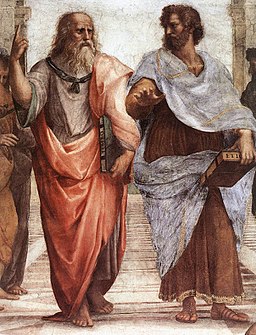
The National Science Foundation now expects every project they fund -- especially ones in which the development of students is a crucial part -- to include a component teaching or reinforcing ethics. So, for the last three years, every student in the Research Experience for Undergraduates at Marshall University has participated in an informal course on ethics based on Fundamentals of Ethics for Scientists and Engineers by Seebauer and Barry. If and when the grant is renewed, the course will now be taught for college credit as PS 220: Ethics for Science.
The new ethics course takes the same starting point as Seebauer and Barry's book: "classical virtue theory," which was first clearly described by Aristotle. This is a robust philosophical approach to ethics which has the advantage of being the basis of much of the thought and culture at the foundation of our whole legal system. Virtue theory was chosen to overcome several problems.
1. Most presentations of ethics for scientists and engineers seem to be only about how to avoid trouble with the law (or employers). Of course, no one wants trouble, but merely avoiding trouble is not exactly ethics. For one thing, laws provide only minimal guidance, usually in terms of things we may not do. For another, although we may hope that laws are ethically correct, there is more than enough variation in laws from place to place and from time to time to prove that this cannot possibly always be the case -- unless one assumes that ethics is only the study of what is imposed by those in power, in which case the word ethics is superfluous.
2. A surprising number of students do not know the difference between ethics as a philosophical study and an anthropological study of the beliefs and practices of people around the world. The latter certainly can be an interesting subject for study, too, but it is not the same thing as ethics. The difference is analogous to that between an historical study of the actual battles of World War II and a cultural study of the newsreels and propaganda films produced. Of course, in many cases the confusion of anthropology for ethics has the purpose of denying that there is an ethical reality to study at all. It is as though an historian were to look at American, British, Soviet, German, and Japanese newsreels and, noting the contradictions, conclude that World War II was nothing but a myth.
It is a mistake to think, though, that Aristotle was unaware of the variation in beliefs and practices or failed to take them into account. On the contrary, very early in the Nicomachean Ethics Aristotle identifies the ultimate goal of "political science" (the science of living in a community -- not exactly the same as our modern political science):
Verbally there is very general agreement; for both the general run of men and people of superior refinement say that it is happiness, and identify living well and doing well with being happy; but with regard to what happiness is they differ, and the many do not give the same account as the wise. For the former think it is some plain and obvious thing, like pleasure, wealth, or honour; they differ, however, from one another- and often even the same man identifies it with different things, with health when he is ill, with wealth when he is poor; but, conscious of their ignorance, they admire those who proclaim some great ideal that is above their comprehension.
Not only do different people have conflicting opinions about what "happiness" is, so do different cultures. To take the silly example of the Star Trek universe, the Klingons thought happiness was "honor", the Vulcans thought it was self-control and "logic", the Ferengi thought it was wealth, and the Terrans (Earthlings) thought it was exploration, or maybe being smug and condescendingly nice. Aristotle was willing to consider all these possibilities and more, but each proposition would have to stand or fall on its own merits.
3. Many students will be of the opinion that the only alternative to a shallow, noncommittal ethics is divine command theory. Although divine command theory is very ancient, it is inherently nonrational, if not irrational, making it a poor subject for philosophical investigation. Conclusions reached through divine command theory are also obviously unpersuasive to anyone with different religious beliefs.
It should be pointed out, though, that the traditional belief (stronger in some religious traditions than in others, to be sure) is that reason alone and divine command produce the same basic ethical conclusions -- sort of how the same mechanics can be derived from either Newton's Laws or from the Principle of Least Action. In support of this is the fact that there are striking similarities in the basic ethical conclusions of societies with very different religious beliefs.
o o O o o
At this point, you may be thinking, "OK, I get the 'ethics,' but where does the 'for science' come in?" Well, Introductory Physics for Engineers is, at its core, introductory physics; the only role engineering plays is in the selection of examples and problems. The situation is analogous in this course: ethics for scientists must make contact with the broad field of ethics, but the examples and problems are selected to reflect difficulties that a scientist might well encounter as a scientist, that is, in the role of student, researcher, instructor, mentor, or employee.




